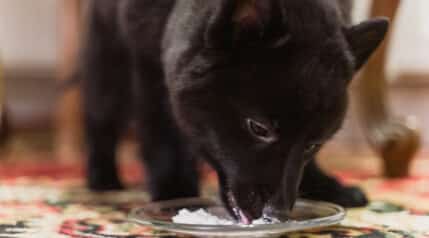Thinking of feeding your canine companion some peaches but aren’t quite sure if it’s a good idea? Peaches are a sweet, juicy fruit that many of us as dog owners enjoy, and it might be tempting to share this treat with your dog.
Many dogs will happily accept most human foods offered to them. In fact, some fruits like papaya, bananas, strawberries, watermelon, and blueberries offer some great antioxidant support for your canine companion if mixed in with their dry kibble. But not all human foods are good for dogs, and some may even be toxic.
So, can dogs eat peaches? As a general rule, the answer is yes, they can, but there are a few things you should know before feeding this tasty summer fruit to your pet. Let’s dive in and take a deeper look.
Are Peaches Safe, Or Good For Dogs?

In short, yes, the flesh of a peach is safe for canine consumption. Peach skins are also safe, but some dogs may not like them due to their fuzzy texture. Too large a piece may get stuck in their throat. As with any type of fruit, you’ll need to make sure you feed them to your pup in moderation. Because peaches have lots of natural sugar, it’s best not to go overboard when feeding them to your canine companions.
Peaches can provide some of the same health benefits to dogs as they do to humans. They contain lots of beta-carotene, which is converted by the body into vitamin A, sometimes known as retinol. Vitamin A plays an important role in maintaining a healthy immune system and is good for skin and eye health.
They are also a source of vitamin C which helps to protect cells throughout the body and is especially important for bone health. They also contain plenty of fiber which regulates blood sugar levels and helps with digestion.
As with many fruits, peaches have high water content. This means they can provide a hydrating snack for your pup. Because of their high water content, they are a great option for pups in the summer when the weather is warmer, and peaches are more readily available. They have a high sugar content which will usually make them very appealing to most canines. But bear in mind that, as with any treat, moderation is key!
Always make sure to thoroughly wash the peach and remove the pit or stone before feeding it to your dog. Similar to pineapple, It is recommended to slice the fruit into bite-sized chunks to prevent choking.
Why Are Peaches Bad For Dogs?
Peaches themselves are not bad for dogs. But there are a few things you should be aware of before feeding them to your pet. They have a high sugar and fiber content. An upset tummy may lead to diarrhea, particularly if your dog eats a larger quantity. If you know your pup has a sensitive stomach, then it is probably best to steer clear of peaches altogether.
Excess sugar in your dog’s diet can lead to obesity and even diabetes. So stick to feeding a small serving of peaches at any one time. Also, don’t feed it too regularly either. It should be an occasional treat rather than a daily one! If your pup is already overweight or has diabetes, then it is best to pick an alternative snack.
Peach Pits Could Cause A Blockage

The pit or stone from a peach poses the biggest risk to your dog. It is not only a choking hazard but also could obstruct your dog’s digestive tract if swallowed. Left untreated, obstructions like this can be fatal, so always contact your veterinarian for advice if your pup swallows a peach pit.
Even if the pit manages to pass through without causing an obstruction, the serrated edges of the stone are abrasive and can cause some serious irritation and damage to the lining of your dog’s digestive tract.
Peach pits are also very hard, and if your dog tries to chew on one, he could damage his jaw or even fracture a tooth.
Parts Of The Peach Contain Cyanide

It is also worth noting that peach pits, along with the leaves and stems of peaches, contain a compound called amygdalin. The digestive enzymes in a dog’s gastrointestinal system will break this compound down into hydrogen cyanide, which is toxic in high doses. Luckily, there are only trace amounts of amygdalin in a single peach pit, so most dogs would need to eat many peach pits to reach a toxic dose of cyanide.
The exception to this would be a dog with liver disease. If your dog has impaired liver function, then the liver might not effectively filter out toxins such as cyanide, and he may be more susceptible to cyanide poisoning. Either way, peach pits still pose several multiple risks if they are eaten, so always avoid allowing your pet access to them.
Windfall Peaches May Cause Alcohol Poisoning

Windfall peaches (and other fruits) should always be avoided, as these can pose some potentially serious health risks. Peaches that have been lying on the ground for a few days will begin to ferment, and this leads to ethanol (alcohol) production within the fruit. If your pup eats a lot of fermented peaches, then he is likely to be at risk for alcohol poisoning.
Signs of toxicity from alcohol include lack of coordination (Fido may appear “drunk”), drowsiness, unconsciousness, and slow heart rate, possibly even leading to a heart attack and death. Even relatively small amounts of alcohol can cause canines to become very sick. So, if you suspect your pup has eaten fermented peaches, then contact your veterinarian immediately for advice.
Windfalls Can Also Cause Mold Toxicity

After a few days, windfall peaches will start to rot and become moldy, which presents another significant risk to dogs. Food mold is formed from mycotoxins which, if eaten by your dog, can make him very sick.
Signs that your dog may have eaten mold include vomiting, un-coordination, muscle tremors, full-body tremors, and seizures. If left untreated, mycotoxin toxicity can be life-threatening, so contact your veterinarian immediately if you suspect any mold was consumed or you notice any symptoms.
Other Health Risks

Always make sure a peach is thoroughly washed before feeding it to your dog to ensure they are free from any chemical herbicides or pesticides. If these chemicals are used properly, and at the correct concentrations, they are unlikely to cause any toxic effects — but it is still not worth taking the risk.
Although uncommon, there is always a small chance that your dog might be allergic to peaches. An allergic reaction could manifest as anything from hives on their skin and excessive drooling to difficulty breathing and anaphylaxis. As with any new food that you give your dog, begin by offering him a very tiny amount of peach to make sure he has no adverse reactions.
Avoid giving your dog canned peaches, especially peaches in syrup. These tend to have a very high sugar content and may even contain harmful additives or artificial sweeteners such as xylitol which can be extremely poisonous to dogs.
Frequently Asked Questions
What fruits are safe for dogs?
There are many fruits that dogs can eat safely, including peaches, apples, bananas, pears, and blueberries. However, some fruits are very dangerous once consumed, so always check with your veterinarian before introducing any new food. Bear in mind that dogs primarily eat meat, so treats such as fruit should only be fed in small quantities.
Can peaches kill dogs?
While the fleshy fruit of a peach isn’t dangerous to dogs, swallowing a peach pit or eating moldy peaches could prove fatal. There is also a very small risk that your dog could be severely allergic to peaches, and if this was the case, an anaphylactic reaction could result in death. However, this would be extremely rare.
Are peach pits toxic to dogs?
Peach pits do contain small amounts of amygdalin, which converts to cyanide when it is digested. However, your dog would need to eat a lot of peach pits to get cyanide poisoning. So, can dogs eat peach pits? No, peach pits can still be very dangerous if swallowed as they could cause a life-threatening gastrointestinal obstruction, so never allow your pup to eat this part of a peach.
Can I feed my dog windfall fruit?
No, you should never feed your dog windfall fruit. This fruit falls from the tree before it is ripe or ready to harvest. Along with the possibility of disease or infestation, windfalls quickly start to ferment and rot, which could result in alcohol poisoning or mycotoxin toxicity from eating mold. Both of these conditions are very dangerous, so always consult your veterinarian if you suspect any windfalls were consumed.
Can my dog eat canned peaches?
It is best to avoid feeding canned peaches, especially those canned in syrup, as these have very high sugar content, and too much sugar is bad for canines. Some preparations may also contain artificial sweeteners such as xylitol which is poisonous to dogs.
Final Thoughts
While peaches themselves are not harmful to dogs, there are other associated risks that you should be aware of. Peaches can be safely enjoyed by your dog as a tasty, sweet treat. Just be sure not to feed him too many.
Dogs can eat peach skin as well as the flesh of the fruit but make sure to thoroughly wash the peach to ensure it is free from chemicals such as herbicides or pesticides. Always remove the peach pit and ideally slice the peach into small bite-sized chunks before offering it to your pup. If you follow these simple rules, there’s no reason why your dog can’t enjoy the occasional piece of peach just as much as you do!






Our 18-year-old foster dog loves fruit and today she discovered peaches. I read the information on this webpage and followed the guidelines and that girl was loving that fruit.
Sounds good, Fran! As always, we recommend checking with your vet before making any food adjustments to your dog’s diet.